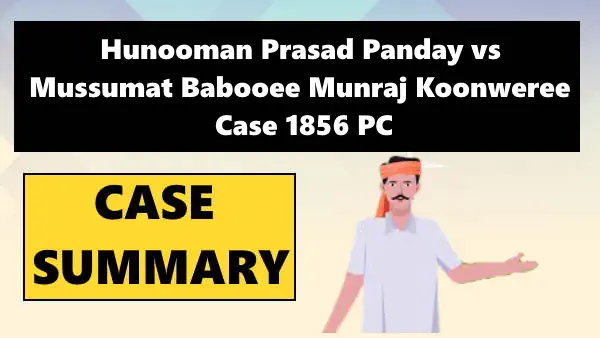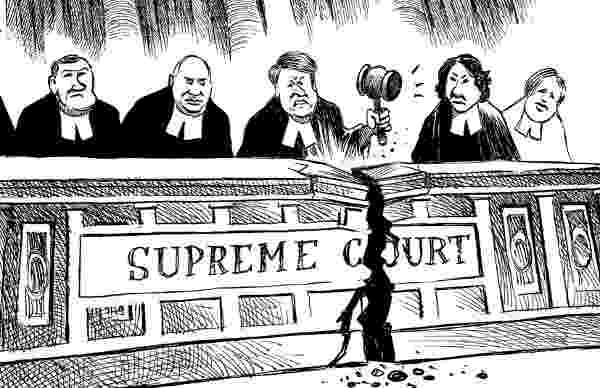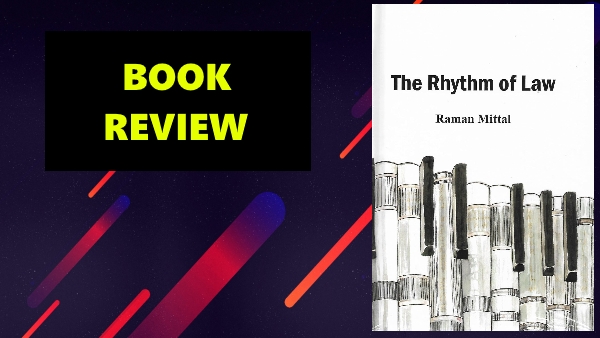Hunooman Prasad Panday vs Mussumat Babooee Munraj Koonweree case concerns the rights of a ‘Karta’ or ‘manger’ to alienate a minor’s property.
FACTS:
- Bux Pandey, the father of the appellant-Hunooman Prasad Pandey, was a moneylender who gave loans to landowners in the Gorakhpur district.
- He gave Raja Jobraj Singh some money as a loan throughout the course of his company. Jobraj Singh mortgaged a piece of land to Bux Pandey as collateral. Raja Jobraj Singh died in the year 1831.
- After Jobraj Singh’s death, his son Raja Shivbux Singh adjusted his account with Bux Pandey and signed an agreement in which Raja Shiv Bux Singh agreed to pay an amount of Rs. 5252/- to Bux Pandey.
- Raja Shiv Bux Singh died later as well. As a result, Hunooman Prasad Pandey adjusted the account with Rani – Digamber Kanwar in 1835, and the two reached an agreement in which Rani – Digamber Kanwar agreed to pay Rs. 3200/-.
- However, due to Rani – Digamber Kanwar’s non-payment of outstanding payments to the government, the land was likely to be seized.
- In this scenario, Hunooman Prasad Pandey submitted Rani’s unpaid payment in the collector’s office. As a consequence, the Rani executed three bonds of Rs. 1000 each in favour of Hunooman Prasad Pandey.
- Both parties adjusted their accounts later in 1842, and Rani agreed to pay Rs. 15800/-. Rani and Lal Indra mortgaged some lands in favour of appellant Diwan Singh as collateral. Lal Indra Diwan Singh was a minor at the time.
- When Lal Indra Diwan Singh reached the age of majority, he filed an action in the Gorakhpur court for the collection of a mortgaged deed issued in 1842 and claimed the relief of regaining the title of the property.
ISSUES:
- Whether the ‘Karta’ or ‘manger’ can alienate the minor’s property or interests.
- If so, when and to what degree, and under what conditions?
- Is the theory of a pious obligation of sons relevant to the repayment of ‘Karta’ or ‘manager’ debts, in any case?
CONTENTIONS:
- Plaintiff’s contention
During the time the plaintiff was a minor, Rani Digamber Kanwar was his guardian. She was an ignorant woman who was imprisoned in the pardah. The loan was taken by staff and agents without Rani’s knowledge. The appellant obtained a land mortgage by deception. The guardian did not have the authority to sell the plaintiff’s property (minor)
- Defendant’s contention
The respondents borrowed money from the appellant on a regular basis. They mortgaged certain lands as a kind of security. When the plaintiff reached the age of majority, she accepted the loan from the appellant. They also executed bonds in the appellant’s favour. The loan was accepted by the mother Muss Badooi Moonraj Kanwar as a guardian of his underage successor Lal Sheetla Bux Banadur Singh, because of the death of Lal Indra Diwan Singh during the litigation.
RATIO DECIDENDI:
Following a hearing with both parties, the trial court rejected the plaintiff’s complaint on the following grounds:
- They have not shown that they obtained the aforementioned loan without Rani’s knowledge.
- That the bonds and mortgage deeds signed at the time were in Rani’s name.
- That the family of Rani needed money at the time of the transaction, and that if the loan was not accepted Rani’s property would be confiscated to recoup government debts.
The Rani did not raise any objections when the lands were mortgaged.
The plaintiff filed an appeal at the upper court in Agra against the trial court’s ruling, which was accepted, and the upper court overturned the lower court’s verdict. Hunooman Prasad Pandey, the appellant plaintiff, appealed the judgement to the Privy Council.
DECISION:
They decided that the mortgage was executed, but that because the mortgagee obtained the mortgage from a restricted owner, he bore the burden of proving necessity. Their Lordships believed that the case of a mortgage for anything had been established prima facie.
CONCLUSION:
- The Manager’s right to charge an estate other than his own for an infant heir is restricted and qualified under Hindoo law. It can only be properly used in an emergency or for the advantage of the estate.
- However, when the charge is one that a sensible owner would make in order to benefit the estate, the bond fiduciary lender is unaffected by the estate’s previous mismanagement.
- As a result, unless he is demonstrated to have behaved in bad faith, the lender in this scenario will not be impacted, even if it is shown that the estate might have been maintained free with better management.
Found Hunooman Prasad Panday vs Mussumat Babooee Munraj Koonweree Case summary useful? We have a bunch of useful topics from family law that will help you in your preparation here >>> FAMILY LAW
Check out our YouTube Channel for free legal videos >>> LAW PLANET YT





